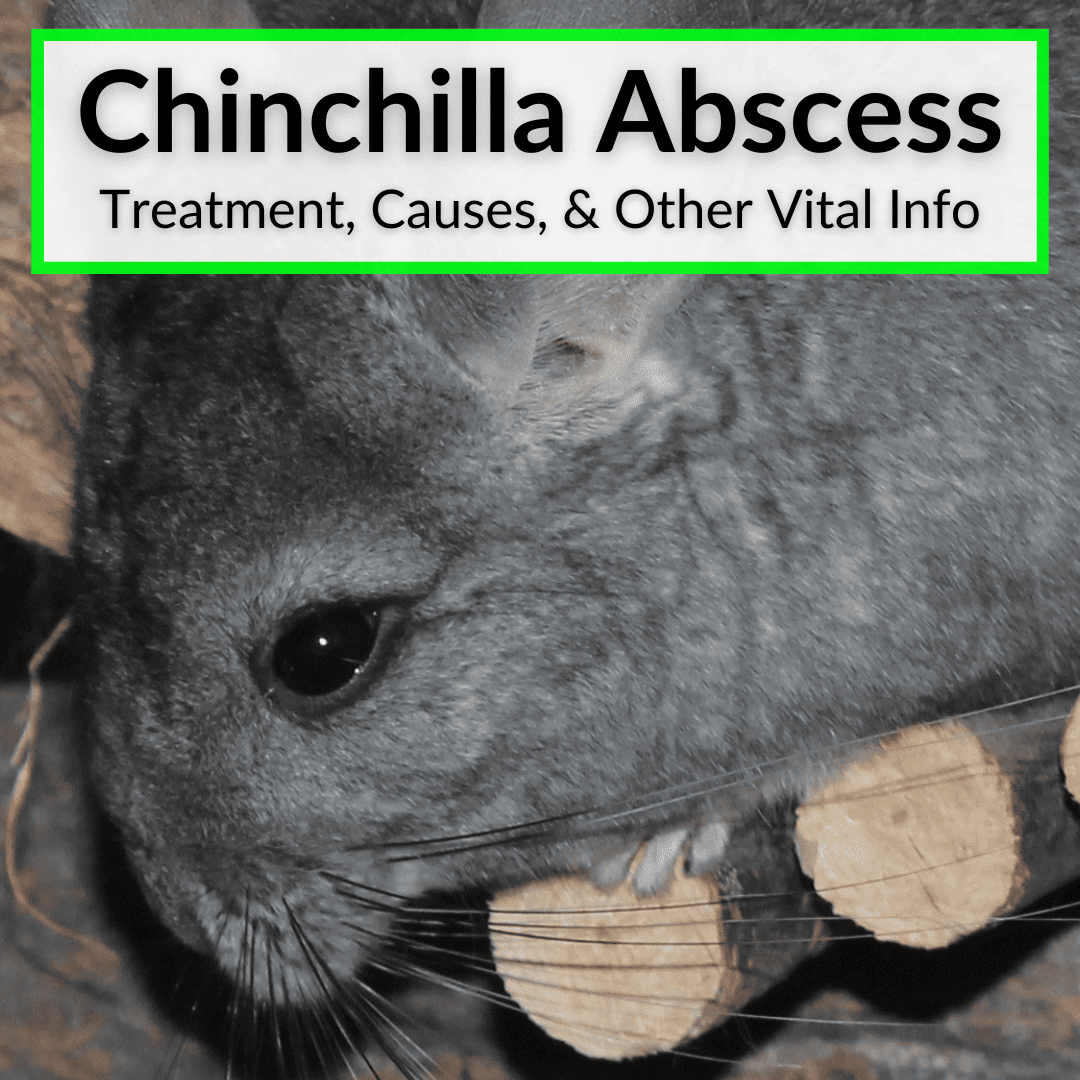
Whenever I notice something out of the ordinary on my chinchilla, I get worried.
I know how quickly things can go from bad to worse with an animal so small.
And from worse to death.
Thankfully, I have no yet had to deal a chinchilla abscess. Or any type of lump on my chin.
But I know it could happen, so I learned everything I could about abscesses in chinchillas.
And I wanted to share it with you, to save you the trouble of having to do the same tedious research.
Keep reading for everything you need to know about chinchilla abscess treatment, what causes them, how to recognize them, and anything else you need to know.
Contents
What Is A Chinchilla Abscess?
A chinchilla abscess results in a pocket of pus. It usually presents itself as a painful, swollen, or inflamed lump or boil.
Causes of chinchilla abscesses typically include bacterial infections or injuries from cage mates or sharp objects. To treat your chinchilla’s abscess, the vet might drain or lance it and also prescribe topical and oral antibiotics.
Causes Of Chinchilla Abscesses
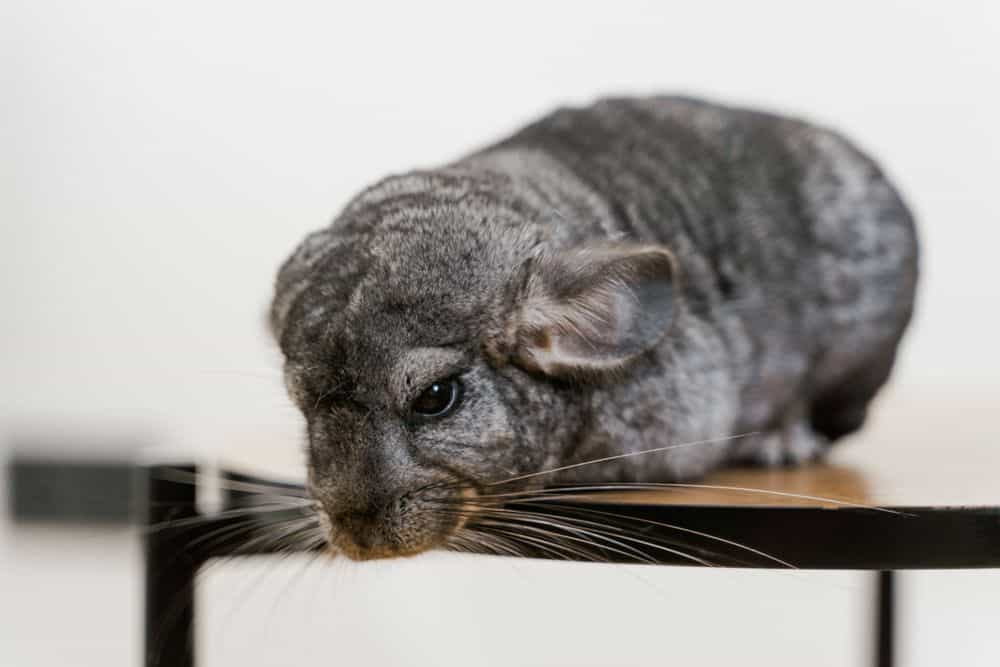
Chinchilla abscesses can occur due any of the following causes.
Injuries From Fights With Other Chinchillas
A chinchilla that has fought with its cage mate or with a new chinchilla over its territory could develop an abscess from the bite wounds or scratches it incurs during the fight. If your pet suffers a bit wound, you’ll want to know the basics of chinchilla wound care.
Entry Of Foreign Objects
Your chinchilla could also develop an abscess if a sharp wooden splinter or bedding material enters its skin. The body tries to throw the foreign object out, and this causes it to develop pus and an abscess.
Bacterial Or Other Parasitic Infection
Parasites like ticks and mites could bite your chinchilla, and the bite site could allow bacteria to enter, resulting in an abscess.
Bacteria such as Staphylococcus spp. or Pasteurella spp. are usually responsible for abscesses in small animals like chinchillas.
Dental Infections
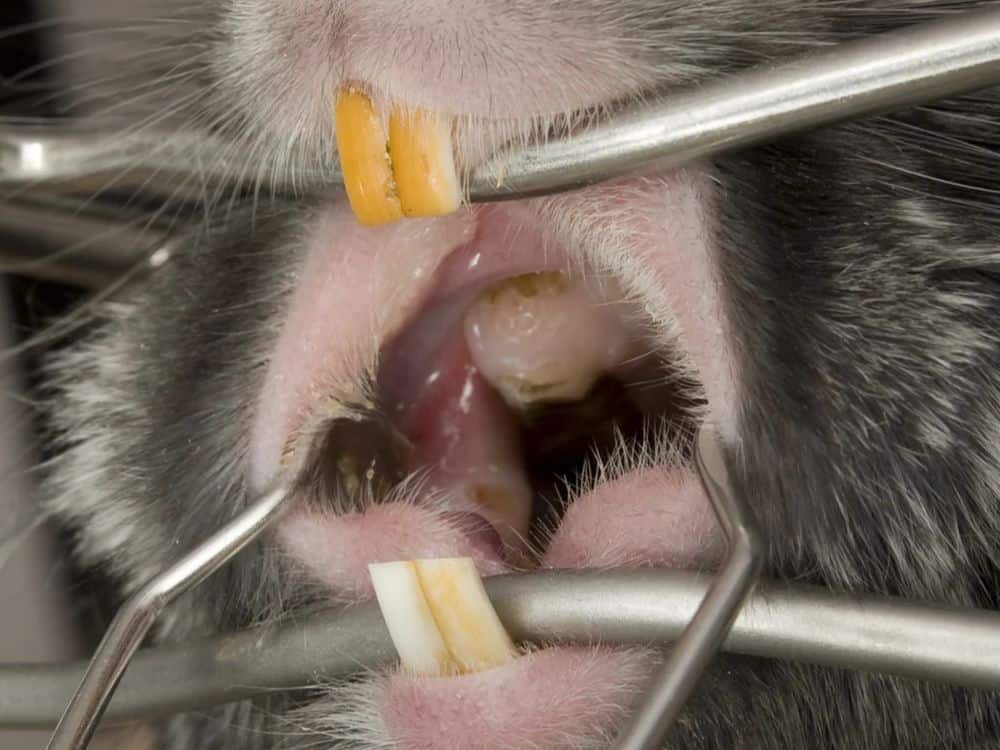
A major characteristic of chinchillas is that they have sharp, ever-growing teeth. These can sometimes grow inward and cut through the gums resulting in a dental abscess. Other types of chinchilla dental disease, like misaligned or overcrowding of teeth, can also cause dental abscesses from secondary infections.
Signs And Symptoms Of Abscesses In Chinchillas
In chinchillas, an abscess may present itself with the following signs and symptoms.
Swelling, Lump, Bump, Or Boil
Your chinchilla might develop a localized swelling, lump, or a boil on its body, head, paws, or even inside its mouth on the gums.
The neck, jaw, and limbs are some other areas where chinchillas develop abscesses. Often, the abscess manifest in the form of swollen lymph nodes in the armpits, cheeks, and neck.
Of course, your chinchilla could have a bump, lump, boil or swelling for a number of reasons. Abscesses are only one possible reason for this symptom. These are all possible causes:
- Abscess: This is a pus-filled swelling. It may be warm to the touch, red, and inflamed. Abscesses occur due to bites, wounds, foreign objects, etc.
- Tumor: These can be benign or malignant. Your vet will suggest a biopsy to confirm.
- Cysts: These are fluid-filled sacs that occur due to hormones, genetic issues, or infections.
- Insect bites: Bumps on chinchillas could occur due to tick bites or insect stings.
- Injury or trauma: Your pet might have been in involved in a fight with its cage mate. Trauma from falling or bumping into something can also cause bumps and lumps on is body.
Redness And Inflammation
The abscess might appear red, painful, inflamed, and warm to the touch. Your pet might refuse to let you touch it.
It might show signs of discomfort or pain such as flinching away from touch, hiding, cowering, or trembling. Mostly, chinchillas with abscesses prefer not to be touched by their cage mates or humans.
Pus And Discharge
Chinchilla abscesses may develop pus or a watery discharge. The color of the discharge will vary based on the stage of the infection. The hair around the abscess will appear wet, soiled, or sticky due to the discharge.
Behavioral Changes
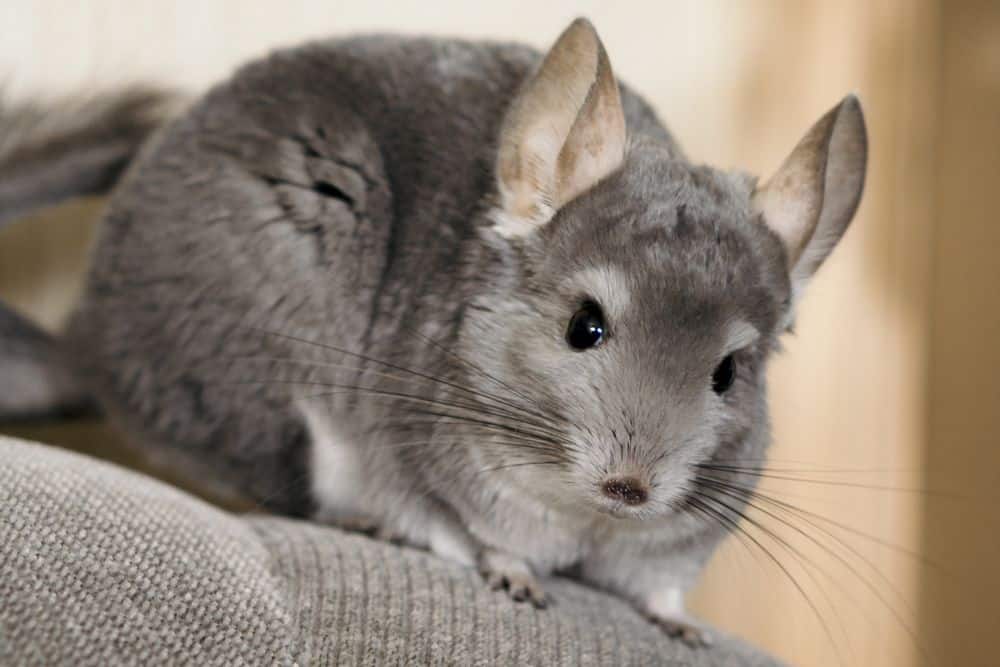
Chinchillas with abscesses, particularly dental abscesses, refuse to eat due to the pain. They might show decreased activity and lethargy. Over time, they could lose weight.
Some chinchillas also develop a fever due to their abscess. They may show aggression, teeth grinding, hissing, snapping, or chattering to indicate they are in pain.
Chinchilla Abscess Treatment
If you suspect your chinchilla has an abscess, you should take it to see a vet. Most vets follow the steps given below when treating chinchilla abscesses.
Examination
A preliminary exam will help your vet know if the abscess is a boil, a cyst, or a hematoma. The abscess’s size, location, appearance, and severity can help the vet decide if the abscess needs draining.
Drainage Or Surgery
If the abscess has matured and is filled with pus, the vet might opt to lance or drain it. To drain the abscess, your vet will administer local anesthesia to your pet followed by an incision to drain the accumulated pus.
Draining the abscess will provide relief from the pain and discomfort caused by the abscess.
In severe or deep abscesses, your pet might need a minor surgery. This involves removing the entire cyst under general anesthesia.
Often, this method of treating an abscess is better than lancing or draining it, because it heals faster than a drained abscess.
Antibiotics And Pain Medicines
Depending on the severity of the abscess, your vet will then provide some painkillers along with local and oral antibiotics. Please follow the complete dosage of the antibiotics, even if your pet seems to get better. This is important to prevent the infection from recurring.
Dressing And Follow-up Care
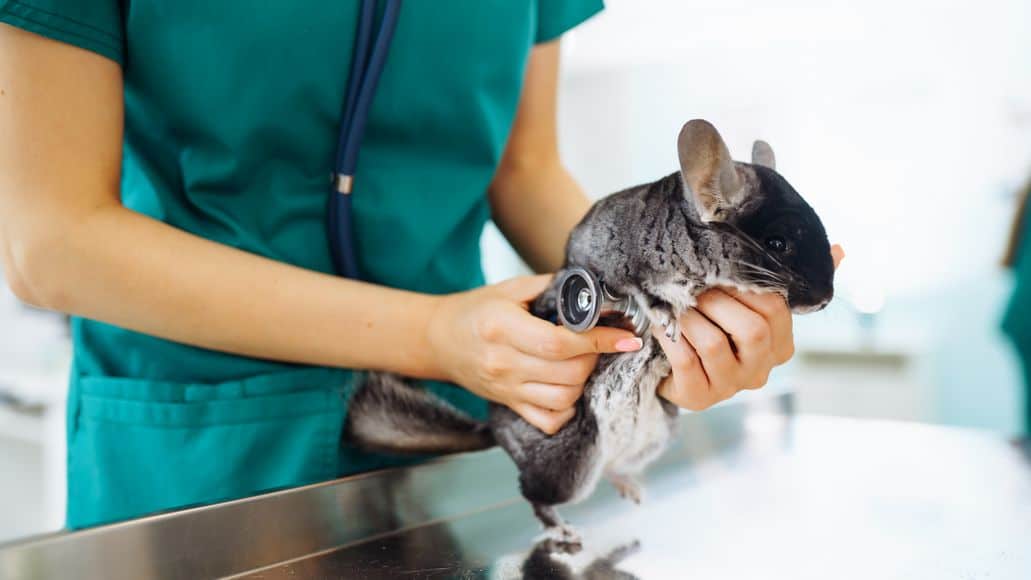
You might have to bring your chinchilla back to the vet’s clinic for follow-up care and to change the bandage or dressing.
In addition, your vet might also prescribe some at-home wound care such as applying compresses, topical medication, changing the dressing or bandage, etc. If your pet has had surgery, make sure it does not lick the surgical site.
Can You Give A Chinchilla Amoxicillin?
You must never give medicines like amoxicillin to your chinchilla without your vet’s supervision and prescription.
Your vet will decide how much amoxicillin is safe to give your chinchilla based on its weight and overall health.
Remember: self-administering human medicines like amoxicillin could harm your chinchilla and might even result in health complications.
Can Chinchilla Abscesses Heal On Their Own?
In most cases, small chinchilla abscesses may drain naturally, shrink, and might even heal on their own.
However, serious abscesses, such as dental abscesses or abscesses containing a lot of pus, need extraction, lancing, and antibiotics.
After all, abscesses are a result of bacterial infections and even if the minor ones heal naturally, the underlying infection might still persist.
Without antibiotics, severe abscesses could worsen, spread, and cause further complications. Your pet might also develop a high fever or blood poisoning due to untreated abscesses.
Please get your chinchilla’s abscess evaluated by your veterinarian to prevent further health problems.
Can Chinchillas Get Cysts?
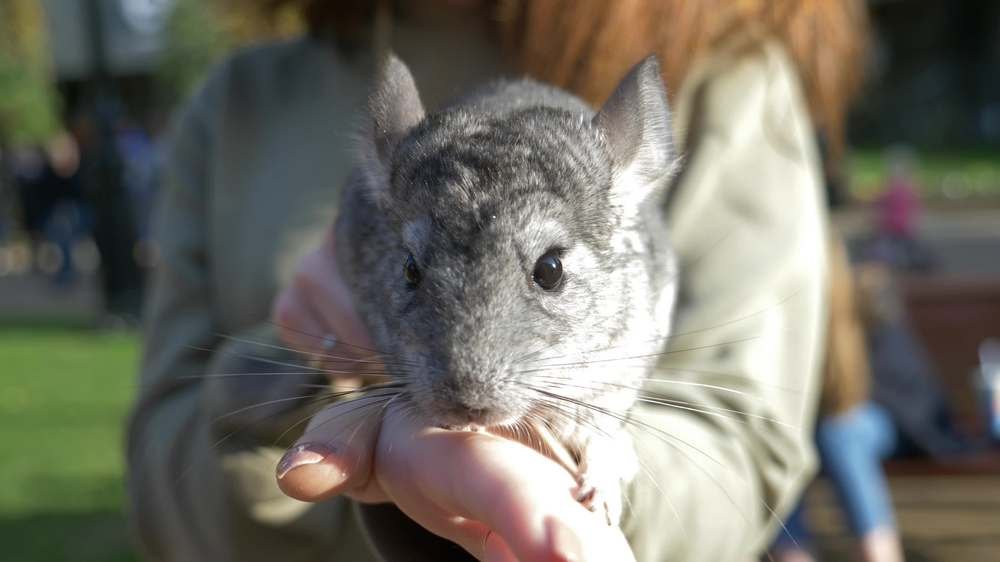
Yes, chinchillas could develop cysts, which are fluid-filled sacs. Chinchilla cysts typically occur under the skin surface, on the reproductive organs, or around the animal’s eyes. Cysts can also be internal.
Many factors can cause cysts, including bacterial infections, hormonal issues, genetics, and certain underlying health conditions. Do not ignore your chinchilla’s cyst. If you notice one, please have your vet examine it.
Chinchilla Tooth Abscess: Causes And Treatment
Dental abscesses in chinchillas typically result from insufficient hay consumption. Chewing hay (and other things like chew toys or even chewing on their cage) is vital for chinchillas, because the chewing and chomping action from continuous hay-eating wears down their sharp teeth.
If your pet does not get the opportunity to chew, it’s teeth will continue to grow. If they get too long, they may turn inward and irritate the gums, which could lead to an abscess.
Poor oral hygiene, dental disease, overcrowded teeth, and tooth decay can also cause chinchilla tooth abscesses. Signs of a chinchilla tooth abscess include the following:
- Facial swelling
- Drooling
- Poor appetite or refusal to eat
- Reluctance to chew
- Weight loss
- Bad breath
- Red or inflamed gums
If you notice the above symptoms, please see an expert veterinarian or a veterinary dentist to provide prompt treatment.
Chinchilla Abscess: Final Thoughts
A chinchilla abscess can be deadly serious, but don’t panic, if you notice a lump on your pet. It could be something completely harmless. Including an abscess.
Many of them never amount to much and go away on their own. But if your pet has one that is filled with pus, get it to a vet for chinchilla abscess treatment right away. Infections are always dangerous.
Leave a Reply